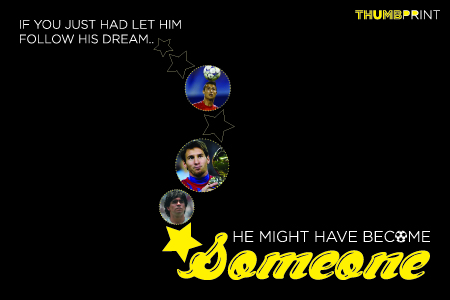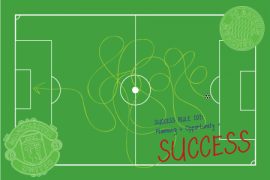Article in brief: What is the society’s role in incorporating sports as a part of our children’s lives and the obstacles coming in the way.

With a defender from the opposing team breathing down my neck and the sunrays blurring my vision of the long ball hovering towards me, I managed to contain the ball on my chest and shoot it in the same motion. It was my first time playing football on a grass pitch and I had just scored the winning goal, I instinctively ran towards the bench and celebrated by diving onto the luscious green turf with my teammates following in my steps. This adrenaline rush from when I was 11 became the fuel to my childhood dream of being a footballer.
Today, I can only tap into this moment through a frame by frame memory, as my footballing fantasies were dashed when my Dad laughed it off and said that ‘football won’t put bread on your table”.
With that response dormant in my memory, I was genuinely pleased to read a few weeks ago about HH Sheikh Mohammed Bin Zayed hosting the parents of the fighters that participated in the latest Jiu Jitsu World Professional Championship that took place in Abu Dhabi.
Praising the parents for encouraging their children in practicing the martial arts sport, he reinforced the notion that competing in such competitions instills characteristics that will strengthen the development of our children. As we have always had unconditional support from our leadership to meet the requirements of our youth, it is now time for the rest of society to look for ways to nurture the positive impact that sports can have on our children.
In comparison to previous generations, participating in a sport today looks like a diminishing venue for children to have fun. One of the reasons is the lack of accessibility, which you would imagine should be available considering the rapid development of our communities. For instance, while flying over Europe, you will always witness a sporting field in almost every community plot.
Sadly and more frequently, children are finding themselves with limited options such as elite sporting academies or facilities that are either expensive or impeded by waiting lists. For the minority that are fortunate to join such establishments, they eventually become overburdened by the commitment of their parents and instead of loving the sport, they develop a sense of obligation leading them to dread any sporting occasion. Besides the lack of open fields, parents have become more protective of their children, becoming worried about the safety conditions of the sport and the possibilities of their children being injured.
In the generation of iPads, Android, and online gaming, our children are more interested in how many kills they got in “Call of Duty” instead of which Karate belt they acquired. As a consequence, it should not be a surprise to us to see our children develop an unhealthy lifestyle, leading us to face crucial issues such as diabetes and obesity.
The work starts from home by introducing the values of sports, allowing our children to grow fond of their hobby and incorporating it as an integral component of their lives. In addition, local entities and schools can be more aggressive in addressing this issue by planning for vacant fields to be installed in communities. Sport entrepreneurial programs such as Ahdaaf and The Dome are progressive in supporting local talent but require more support to enable them to achieve their overall goal of discovering and nurturing talent.
While watching a football game on TV with my dad a couple of years ago, the commentator mentioned the wages the players receive from the clubs they play for. With his gaze still fixated on the TV screen, he cleared his throat and innocently asked me, “ Why couldn’t you be a footballer, you would have made us rich.”




1 Comment